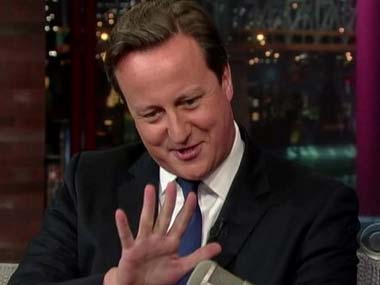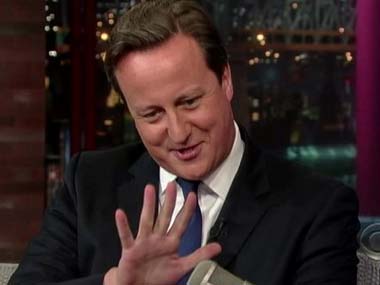Britain has set Sri Lanka a March 2014 deadline to address shortcomings on human rights related issues, failing which an international independent investigation will be inevitable, reported Sri Lankan newspaper
the Colombo Gazette
. “When asked why he was waiting till March to push for an international investigation, Cameron said Sri Lanka should be given some time to get its investigation mechanisms in order”,
reported The Nation
, another Sri Lankan daily. [caption id=“attachment_1233141” align=“alignleft” width=“380”]
 Image from IBNlive[/caption] Cameron had earlier made a fact-finding mission to the country’s war-torn north, reported Associated Press. Dozens of ethnic Tamils, including many carrying letters for the British leader, held a protest with photographs of relatives who were among thousands who went missing near the end of the war in 2009. They were prevented from speaking with Cameron, but a reporter traveling with him gathered the letters and offered them to British officials. He also met with displaced civilians still living in a camp four years after the end of the war. Many of their homes and lands are still occupied by the military or designated as high security zones. “As Mr Cameron’s entourage was leaving the public library, a group of screaming women - desperate to make their representations directly to the first world leader to come here - pressed photographs and petitions into our hands”,
said Nick Robinson
, the political editor of the BBC. “There is the problem of human rights as we speak today: the people who have disappeared, the lack of free rights for journalists and a free press,” Cameron told reporters. “Most important of all is the need for proper investigations to look into what happened at the end of this very long, appalling civil war,” he said. According to
the BBC
, Cameron had later ‘clashed’ with Sri Lankan President Mahinda Rajapaksa as he pushed for action to protect the rights of its minority Tamil community. The Colombo Gazette report added that speaking to reporters at the BMICH (Bandaranaike Memorial International Conference Hall) on the sidelines of the Commonwealth summit, Cameron said he hoped Sri Lanka will make more progress by the time the UN Human Rights Council meets in Geneva next March. The Commonwealth has been harshly criticized for holding the three-day summit in Sri Lanka after its government repeatedly refused to allow independent investigations into alleged war crimes and rights abuses during and after a 27-year civil war. Recent reports of media harassment and rights abuses have also raised alarms. President Mahinda Rajapaksa, who together with his brothers has controlled the Buddhist Sinhalese-majority nation since 2005, insists his army has committed no abuses and the courts and other institutions are handling any complaints. He invoked Buddha in his opening speech with a quote that appeared to gently chastise nations questioning Sri Lanka’s commitment to democracy and human rights. “Pay no attention to the faults of others, things done or left undone by others. Consider only what by oneself is done or left undone,” he said, speaking briefly in Sinhala. He also warned against the Commonwealth turning into a “punitive or judgmental body.”
Image from IBNlive[/caption] Cameron had earlier made a fact-finding mission to the country’s war-torn north, reported Associated Press. Dozens of ethnic Tamils, including many carrying letters for the British leader, held a protest with photographs of relatives who were among thousands who went missing near the end of the war in 2009. They were prevented from speaking with Cameron, but a reporter traveling with him gathered the letters and offered them to British officials. He also met with displaced civilians still living in a camp four years after the end of the war. Many of their homes and lands are still occupied by the military or designated as high security zones. “As Mr Cameron’s entourage was leaving the public library, a group of screaming women - desperate to make their representations directly to the first world leader to come here - pressed photographs and petitions into our hands”,
said Nick Robinson
, the political editor of the BBC. “There is the problem of human rights as we speak today: the people who have disappeared, the lack of free rights for journalists and a free press,” Cameron told reporters. “Most important of all is the need for proper investigations to look into what happened at the end of this very long, appalling civil war,” he said. According to
the BBC
, Cameron had later ‘clashed’ with Sri Lankan President Mahinda Rajapaksa as he pushed for action to protect the rights of its minority Tamil community. The Colombo Gazette report added that speaking to reporters at the BMICH (Bandaranaike Memorial International Conference Hall) on the sidelines of the Commonwealth summit, Cameron said he hoped Sri Lanka will make more progress by the time the UN Human Rights Council meets in Geneva next March. The Commonwealth has been harshly criticized for holding the three-day summit in Sri Lanka after its government repeatedly refused to allow independent investigations into alleged war crimes and rights abuses during and after a 27-year civil war. Recent reports of media harassment and rights abuses have also raised alarms. President Mahinda Rajapaksa, who together with his brothers has controlled the Buddhist Sinhalese-majority nation since 2005, insists his army has committed no abuses and the courts and other institutions are handling any complaints. He invoked Buddha in his opening speech with a quote that appeared to gently chastise nations questioning Sri Lanka’s commitment to democracy and human rights. “Pay no attention to the faults of others, things done or left undone by others. Consider only what by oneself is done or left undone,” he said, speaking briefly in Sinhala. He also warned against the Commonwealth turning into a “punitive or judgmental body.”
David Cameron 'clashes' with Rajapaksa, gives SL March deadline
FP Staff
• November 16, 2013, 10:30:24 IST
Britain has set Sri Lanka a March 2014 deadline to address shortcomings on human rights related issues, failing which an international independent investigation will be inevitable
Advertisement
)
End of Article